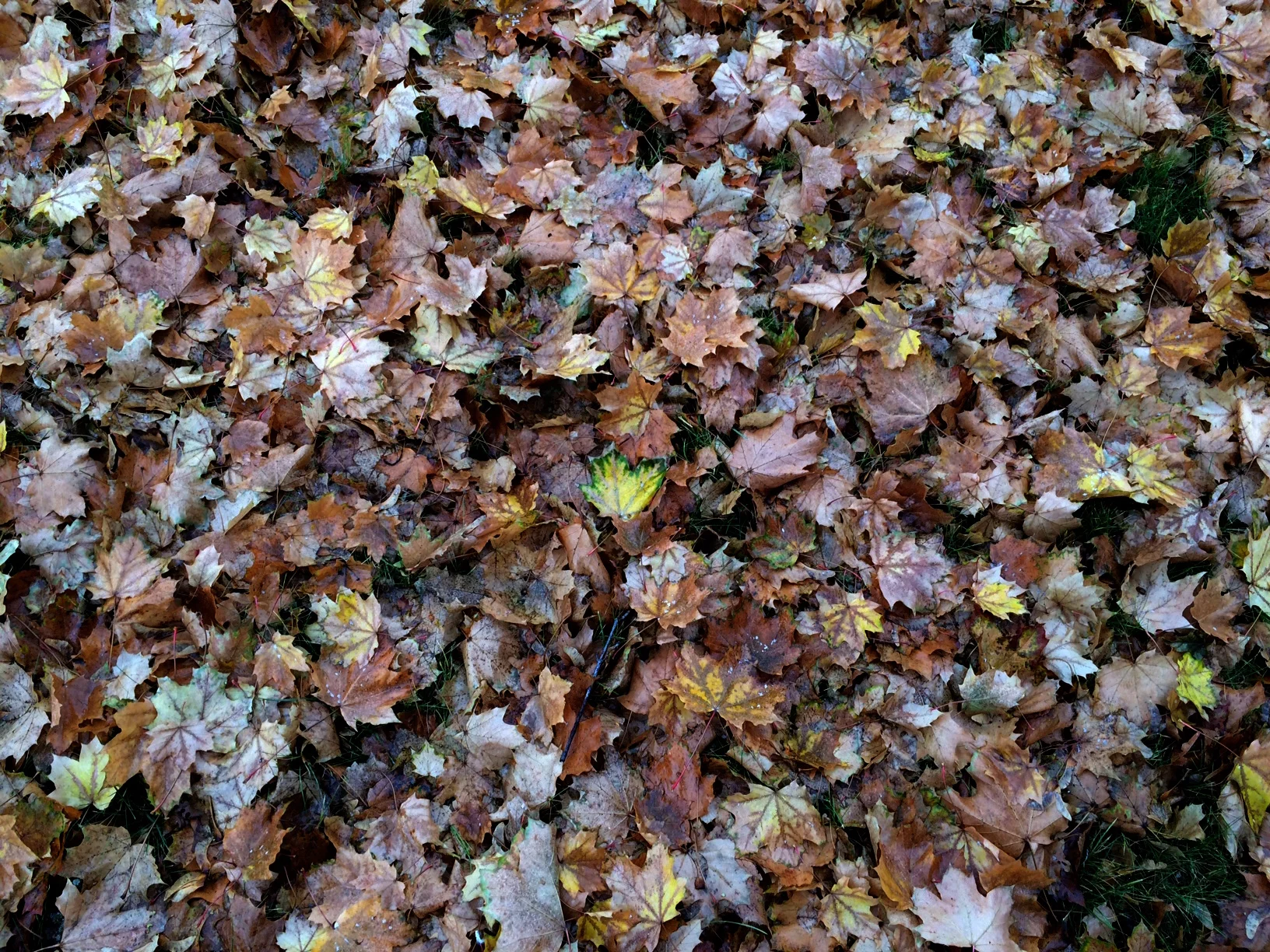The leaves on the trees around my home are making their fiery grand finale. They flash red and gold and tilt homeward toward the earth. I sit looking out the window, and reflect. We are living in intense times, many of us enduring high-highs and low-lows and shockingly sudden changes. The political and social scene seem to mirror the magnitude of personal challenges all around and within us. As I sit with here, my head full of cloudy ideas, and my heart beating with human ache, I ask silently of the trees: "What lesson can we learn to help us in this current world?"
A single maple leaf, bright yellow, makes a funerary descent from it's high branch to the wet ground. What we need now, is to learn how to fall.
A Cultural Void
Most of us have never explicitly been taught about endings, loss, failure and grief. We experience these things in our lives and tend to diminish them, push them away, feel ashamed. We tell ourselves that we are weak if our creative project falls flat, or our relationship falls short, or our business deal falls through. When we make mistakes as individuals, communities, and corporations, we bail ourselves out, or convince others to do so, to avoid the pain of humiliation or disappointment. We hide our failings and our heartbreak, we smile or laugh and say we're fine. But the truth underneath is clear:
We are not fine. As someone funny and wise once said to me; "The best thing I ever heard from my therapist was "it's ok to not feel ok". And it's true.
When we grieve the state of our divided nation, our history of oppression, the prevalence of violence, the declining environment and economy, we are grieving because something is broken. When we become angry over innocent lives taken, or freedoms revoked, or toxic food and water being consumed, we are feeling real, measurable losses.
So how have we been managing these realities in a society where there is such little space for personal and collective grief and accountability? We blame. Check out the presidential debates to see the blame complex in action. We blame others or we blame ourselves when we meet the difficult emotions stirred by the truths of our world, or to distract from our own shortcomings. Blame often gets a pretty bad wrap, and yet we do it all the time in our personal, professional and social lives.
Why We Blame
Now, before we go blaming blame for all our troubles, let's explore it's purpose. Blame has a psychological function like all defenses do--it protects us when we need it. Blame is like a turn out in the road. Its a place where we can pull over and pause after something truly shocking or agonizing has happened. But we are not meant to build a homestead there. Blame is a place we go to turn away from the pain of reality, until we can bear the reality of pain.
If we never learn to bear this reality, blame erects walls around us that create divisiveness in a time where most of us desperately need connection. Blaming prohibits us from productively using the energy of grief. When we habitually blame "them" (whoever they are), we lose our sustainable agency and ultimately our intimacy with pain.
Why on earth would we want to be intimate with pain? Because the heart of pain is where love, mystery, and hope also live. It is no coincidence that "falling" is used to describe a process of loss, but also a process of love. There is an intelligence that arrives only after we allow ourselves to fall into the true experience of whatever we are facing. If we never accept the falls which are inevitable to a human life, we risk becoming cut off from one another, and from the very ground upon which we stand. As writer Yasmin Mogahed eloquently puts it "Never curse a fall. The ground is where humility lives". The ground is also where connection lives. As social worker and researcher Brene Brown states "The two most powerful words when we're in struggle: 'me too'." When we have the courage to open to ourselves and to trusted people during difficult times, we may learn that there is a steady ground of belonging that lies underneath.
In Hebrew, the word Qal which means "to fall", and "to fail", also means "to prostrate " or "to bow in reverence upon the ground". So, falling could bring us to the end--of a life, a dream, an identity. But it also might bring us down to the place where everything new begins. Which means that the fall might just be the thing that saves us.
Here are some helpful tips for enduring these intense times, and honoring whatever kind of fall you might be going through:
- Create a practice for marking endings: (ending of relationship, job, a death, a move, a change in identity, watching children grow)
- Listen to a favorite piece of music, or read or write a story or poem, light a candle, walk or sit in a peaceful place, look at photos or watch a movie with meaning to you.
- Know your technology limits: how many commentaries do you need to read about politics before you and your nervous system have had enough for now?
- Connect. With your people, nature, faith, creativity, humor--whatever makes you feel alive.
- Notice essential good-heartedness--in children, pets, neighbors, strangers, partners, yourself.
To your resilience, courage, and ability to endure the descents of life. Happy Fall.
To Your Health,
Megan
